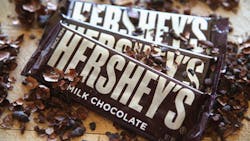Hershey's Failed Deal Renews Image as a Company Not for Sale
The latest failed acquisition of Hershey Co. (IW 500/134) has renewed the chocolate maker’s reputation as a company that can’t be bought.
After Mondelez International Inc. (IW 500/39) abandoned merger discussions on Monday, Hershey shares plunged as much as 11% and left investors with a familiar taste. For years, Hershey has been the subject of takeover speculation. And for years, deal talks have sputtered and died.
The most recent rejection came after Mondelez proposed sweetening its offer to $115 a share, according to a person familiar with the situation. That was 18% higher than the stock’s price before deal talks were disclosed in June, but Hershey wanted to start the discussions at $125, said the person, who asked not to be identified because the negotiations were private. Turmoil at the Hershey Trust, the nonprofit organization that controls the company, also hampered merger talks.
Hershey, already struggling with shifting consumer tastes and an ill-fated expansion into China, may now have also scared away future bidders.
“This will have a dampening effect on potential offers for Hershey,” Bloomberg Intelligence analyst Ken Shea said. “People who may have been interested will look at what just happened and be more skeptical that they can get a deal done.”
Mondelez: No Path Forward
Mondelez’s initial $107-a-share offer in cash and stock would have valued Hershey at about $23 billion. Hershey’s board said on June 30 that it unanimously rejected that bid. Talks continued, but Mondelez said on Monday that it saw “no actionable path forward toward an agreement.”
The announcement sent Hershey shares down as low as $99 in early trading on Tuesday, erasing much of their recent rally. The stock had climbed 25% this year through Monday’s close, with most of that gain coming when news of Mondelez’s approach became public.
Ending the pursuit of Hershey brought some relief to Mondelez investors, who may have been concerned about a takeover battle. Shares of the Deerfield, Ill.-based company rose as much as 3.6% to $44.60 after the announcement.
Mondelez Chief Executive Officer Irene Rosenfeld, who saw the deal as a chance to create the world’s largest candy company, lamented that the two sides couldn’t reach an agreement.
“Combining our two iconic American companies would create an industry leader with global scale in snacking and confectionery,” she said in Monday’s statement. “While we are disappointed in this outcome, we remain disciplined in our approach to creating value, including through acquisitions.”
Good Fit?
The merger would have given Mondelez a bigger share of the domestic market -- a weak spot for the maker of Oreos and Triscuits. Hershey generated almost 90% of its revenue in North America last year, with the majority of that coming from selling chocolate in the U.S. Mondelez, meanwhile, has suffered from currency fluctuations and slowing overseas economies.
“The strategic fit with Mondelez was pretty compelling,” Shea said. “Not a lot of other companies can do that kind of combination.”
Hershey owns the Cadbury license in the U.S., while Mondelez sells the candy in the rest of the world. Unifying that brand was considered part of the rationale for the merger.
But when Hershey snubbed the $107-a-share bid in June, it said that the offer “provided no basis for further discussion between Mondelez and the company.” Though Mondelez was willing to raise the price by $8 a share, Hershey demanded at least $125, said the person with knowledge of the matter. The Wall Street Journal previously reported on the negotiations.
Hershey Trust Upheaval
Then there’s the Hershey Trust. The $12 billion charity organization is in flux, with many of its directors headed for the exits. Hershey didn’t want to even consider a transaction with Mondelez until the charity’s board is reconstituted next year, another person familiar with the situation said.
The trust, which runs Hershey Entertainment & Resorts Co., controls about 81% of the chocolate company’s voting shares. It also operates the Milton Hershey School, which educates underprivileged children. After facing accusations of lavish spending in recent years, the charity reached a deal in July with the Pennsylvania attorney general to reform its management practices. That agreement called for three board members to retire by the end of the year, with two more stepping down by end of 2017.
The trust has scuttled takeovers in the past. Nestle and Wm. Wrigley Jr. Co. both made offers to buy the company in 2002 before being rebuffed. The trust also has stood between Hershey and a deal with Cadbury, which was ultimately acquired by Kraft Foods.
Another wrinkle: The Pennsylvania attorney general has the right to review a deal to acquire Hershey. That’s because the trust is legally obligated to continue financing the Milton Hershey School. Because the organization is supported by profits from the chocolate company, the state can try to stop a sale if it determines that school funding is threatened.
To entice Hershey and its stakeholders, Mondelez offered some unusual concessions with its bid. The suitor pledged to keep the combined company in Hershey, Pa., and retain the Hershey name, according to the Journal. With the trust’s recent upheaval, Mondelez may have felt like it picked the right time to pounce, Shea said.
“I think they thought there was an opening,” he said. There wasn’t.
By Craig Giammona and Ed Hammond
About the Author
Bloomberg
Licensed content from Bloomberg, copyright 2016.
